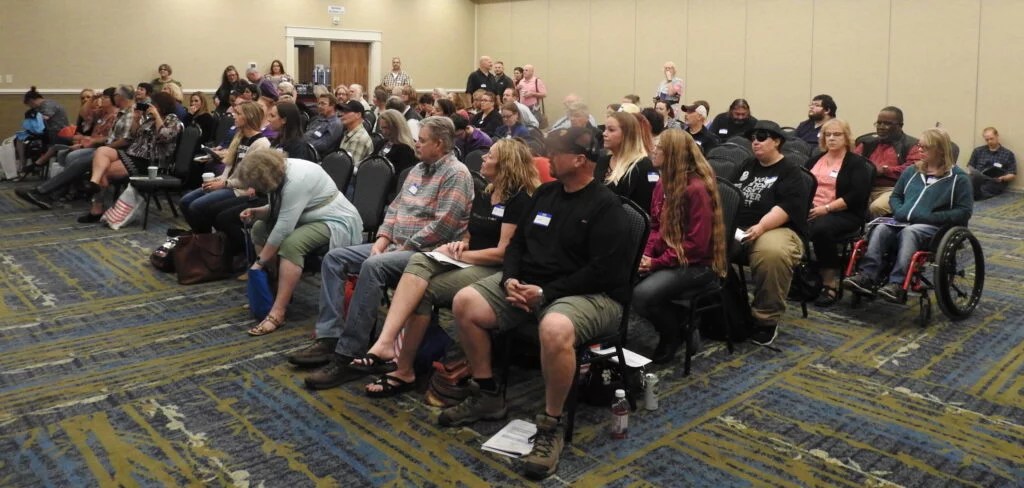We are a network of individuals who are on the path of recovery.
We identify as being in recovery from mental health, substance abuse and or addiction struggles. Together we share information, provide peer support, advocate with a united voice and improve the system. We come from places all across Montana, with different stories and experiences but together we make a difference. This is the Recovery Movement in Montana.


Realizing Recovery Blog
The Spiritual Quotient for Life
Spiritual Intelligence (SQ) is discovering the aspects of us that inspire creativity, healing, and purpose. Another name for this is intuition, which lives on our brain’s right side. The intelligence Quotient (IQ), the left side of the brain, measures what we accumulate outside of ourselves; learning happens through reading books, listening to speeches, researching, and observing others. We analyze and compare data intellectually and incorporate it into life. Learning starts early in life, like learning to walk and speak, and evolves into helping us understand, perceive, and assess the world around us. It is critical for survival; it helps us meet mental, emotional, and social demands. Learning does not play favorites; it does not self-correct. The school of hard knocks teaches different lessons and incorporates skills that protect a person from danger. For example, due to the trauma I was experiencing at home as a child, it was much more important to maintain a sense of safety versus learning math, my left brain told me. Confidence was a mask I wore to protect secrets, in comparison to an organic experience that prepared me for harnessing a successful career path
Embracing the Simple Pleasures of the Christmas Season
Ah, the Holidays. A season that is meant to bring connection, gratitude, love, hope, and joy. But for many, the holiday season can be extremely painful or difficult for a variety of reasons. I am not a religious person, so the spirit of Christmas for me may be different than many people. Christmas is a celebration, a time for giving and not simply a day we exchange gifts. The spirit of Christmas is in the “togetherness”, it’s in the thought to which you put into thinking about others, it’s a selfless time, where we forgive, take stock of what’s important and become better versions of ourselves. I love the beauty of Christmas. We begin to decorate the first weekend after Halloween, so we can celebrate the season a little longer. My oldest daughter even has the middle name December, because being pregnant with her reminded me of the joy and love that I feel during that month. We love Christmas music and driving around to look at lights. And we also love being able to give the people we love thoughtful gifts.
Native American Heritage Month
The arrival of Native American Heritage Month heralds a deeply personal journey for me, a Blackfoot woman steadfastly navigating the intricate path of recovery. Within the expansive tapestry of indigenous cultures, I discover not only solace and strength but a profound connection to my roots that serves as the cornerstone of my journey of self-discovery. Engaged in tribal liaison work with Montana tribes, this month transcends mere celebration; it stands as a testament to the transformative power of cultural heritage, weaving through my role as a mother and illuminating the unique lens of recovery from an American Indian woman’s perspective.
A Miracle in Recovery
This story is very close to my heart. Anna is my sister. I have seen her struggle since her teenage years. At the heart of her struggles, and only discovered in recent years, is her diagnosis of several mental health challenges. She was also adopted from South Africa as a toddler and has struggled with feelings of abandonment and attachment her whole life. Anna has fought family and friends in search of what would make her feel better, feel more. It has challenged our family as she has lost battles in the past.
A Personal Gratitude Challenge
As I typically do when writing on a topic, I looked for definitions and synonyms to make sure that my readers and I are on the same page. Gratitude is “the quality of being thankful; readiness to show appreciation for and to return kindness”. I like those words: thankful, appreciation, kindness. I think it is easy to say thank you, but more powerful to show appreciation and kindness. It is similar to how saying sorry is just a word, but an apology says why and how you will make it better. It carries more weight.
Sensory Processing Disorders
Sensory Processing Disorders (SPD) are a complex and often misunderstood set of conditions that affect how individuals perceive and respond to sensory stimuli from their environment. These disorders can have a profound impact on a person’s daily life, from their ability to interact with others to their emotional well-being. While much progress has been made in understanding SPD in recent years, there is still much to learn about its causes, symptoms, and treatment options.
Embracing Resilience: LGBTQ+ A Journey of Struggle and Triumph
In the tapestry of human history, the LGBTQ+ community has woven a thread of resilience, creativity, and love that stretches back centuries. Despite monumental progress in recent decades, LGBTQ+ individuals continue to face discrimination, adversity, and stigmatization. This blog aims to explore the intersection of LGBTQ+ history, mental health, addiction, and recovery, shedding light on the unique challenges faced by this community. As a lesbian woman in long-term recovery, who came out at the age of 37, I’ve witnessed firsthand the transformative power of acceptance, support, and inclusivity from many within recovery communities. Yet, like countless members of the LGBTQ+ community who have come before me, my journey has also been marked by moments of fear, judgment, and significant adversity. Embracing my authentic self has meant navigating a world that, at best, strongly favors heteronormativity, and at worst, as history has shown, can be hostile to individuals like me.
Are You a Parent at Increased Risk for Depression?
I am a mom of two, now adult, children with behavioral health challenges and I work as a Family Peer Supporter helping other parents currently raising children with special healthcare needs including behavioral health. As a Family Peer Supporter, I get to walk beside families and help lift their burden by listening and connecting through a shared lived experience. Parenting is stressful in and of itself. It’s a full-time job with no training manual. Parents don’t clock in and clock out. They don’t get to call in sick. And a literal life depends on how well you do! Like most moms, I envisioned the future for my children including friends, activities, school, summer camp, growing up, high school dances, graduation, college, marriage, children of their own, and so on.
The Greatest Mistake
I am going to try something new with this month’s theme: recovery. Honesty is admirable, the more I dive into the depths of my mental health recovery journey, I know honesty will be the key that I didn’t have in my pocket the first time around. I had some old triggers resurface for me and new obstacles present themselves the last couple weeks. Here are my take aways……
Patchwork Recovery
Recovery is 1000 small decisions that, at the moment, feel insignificant yet, when added up over time, have. I recorded my recovery journey on countless pieces of paper to create a compilation of ah-ha moments from depths of darkness into life in recovery. My recovery has been a patchwork of written thoughts, shapeless until I weaved them into my life, attempting to live them as profound as they are when they dance in my mind. This is where creativity began to inform my life, realizing that it is my choice to transform past conditioning into the spark that ignites passion. Dare I show the world who I am behind the facade of correct behavior and be the superstar I create in my mind?
Advocacy
Check out our new page dedicated to tracking state and federal bills, executive orders, and lawsuits.
 Standing up for what we believe is right, having a voice, making choices in recovery, and sharing our own recovery story are some of the things that make up advocacy and self-advocacy.
Standing up for what we believe is right, having a voice, making choices in recovery, and sharing our own recovery story are some of the things that make up advocacy and self-advocacy.
Let’s start with self-advocacy which refers to an individual’s ability to effectively communicate, convey, negotiate, or assert his/her own interests, desires, needs, or rights. It involves making informed decisions and taking responsibility for those decisions (Van Reusen et al., 1994).
Knowing yourself and your strengths, needs, and interests is the first step toward advocating for your rights. Once we begin to find our way on the path of recovery, we may want to begin to advocate for ourselves with those around us—peer supporters, friends, family, service providers, and doctors. These conversations may be difficult, but having them is vital to your recovery. Remember, you are the expert on yourself.
It may be that prior to getting on the path to recovery, others were making decisions for you or acting in what they believed to be your best interest. Now may be the time for you to let others know what you believe to be in your best interest. You may find yourself in the process of taking control and making decisions affecting your life and perhaps others’ lives. This process of self-determination means making informed choices, problem solving, setting and attaining goals—essentially being a self-advocate.
Advocacy or advocating for others may be something you are interested in doing. Advocating for another person isn’t about acting in a person’s perceived best interest, but it is standing with a person to ensure they are able to articulate and obtain what they want or need. Perhaps you may consider speaking up and advocating for various changes in the services in your community.
Here are a few examples of advocacy:
- Speak to your legislature or a special committee.
- Get involved with an advocacy group or organization.
- Share your recovery story to support others in recovery.
- Whether advocating for yourself, for others, for your community, or as part of an organization, advocacy is very self-empowering. You can make a real difference in your life, the lives of others, and even the community.
- Reach out to Montana’s Peer Network and share your recovery story on one of our “Recovery Talks” podcasts.
Advancing Advocacy Blog
Intersectionality
Millions of people are affected by mental health issues and LGBTQIA+ youth and adults are especially affected. For example, the CDC reports that nearly 48% of LGBTQIA+ youth seriously considered suicide in the past year as compared to their non LGBTQIA+ counterparts. 39% of LGBTQIA+ adults rate their mental health as “fair” or “poor” while 16% of non LGBTQIA+ adult report the same. These disparities are often due to lack of support, discrimination, social rejection, and difficulty accessing care. Being LGBTQIA+ is not the risk factor in itself, the discrimination these people experience is.
Awareness into Action
Reposted from Mental Health America’s Mental Health Month 2025 Planning Guide While one in five people experience a mental health condition each year, every single one of us has a mind to take care of. Furthermore, mental health is not just a personal issue—it’s a societal one. And the need for action has never been greater.This…



